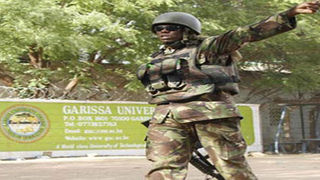
Security personnel stationed at the entrance of Garissa University College on April 2, 2015 after armed gunmen attacked the institution.
| File | Nation Media GroupGarissa
Premium
Garissa varsity attack: Frankline Wekesa seeks pay for son's death
A man who lost his 21-year-old son to Al-Shabaab militants at Garissa University six years ago has sued the government seeking compensation and damages for the killing.
Frankline Wekesa Simiyu wants the High Court to order that his son Tobius Sifuna’s fundamental rights to freedom and security and the right to life were denied in the 2015 attack.
Sifuna joined the university in 2013 and was studying for an undergraduate degree in education.
A group of masked men stormed the campus on April 2, 2015 as some students held their morning prayers.
They held more than 700 people hostage for several hours before shooting them. Some 148 people, most of them students, died. Three men were convicted and jailed in 2019 for the attack.
Mr Simiyu says students were ordered out of their dormitories and made to lie down on hard surfaces for hours, before they were executed in cold blood.
Al-Shabaab claimed responsibility. The terrorist group had allegedly issued a warning about an impending attack.
Mr Simiyu argues that the government violated the students’ fundamental rights to freedom and security by failing to provide enough security.
Relevant security agencies were advised to put in place necessary measures to foil any attempted terrorist attack, he says.
“There was blatant lack of security vigilance by the security officers thus causing the death of the deceased and the other innocent children,” he says.
He also accuses security forces of taking too long time to respond to the attack, giving the militants more time to massacre students. He said his son contacted his family and relatives desperately pleading to be rescued before he was killed.
Mr Simiyu says the Bill of Rights obligates the government to protect citizens from such violence.
President Uhuru Kenyatta, he says, had pledged support for families of the victims but the government has done nothing, prompting him to file the case.
Through lawyer Gitau Mwara, Mr Simiyu says Sifuna’s death left his family and relatives in despair as he was their only great hope as a firstborn child studying for a degree.





